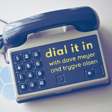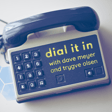
S3 Ep19: Shel Holtz on AI, Podcasts, and Strategic Communication
In this episode of the Dial It In podcast, the hosts feature Shel Holtz, a seasoned communication strategist and podcaster. Shel discusses his long association with the podcasting world, having recently celebrated 20 years with his 'For Immediate Release' podcast. The conversation delves into Shel’s career, including his shift from consulting to becoming the Senior Director of Communications at WebCore. They explore the transformative impact of AI on communications, sharing impressive AI capabilities such as automating tedious tasks. The hosts commend Shel for his advanced audio-visual setup and his hands-on approach to communication technology. Shel also emphasizes the importance of strategic planning in communication efforts, recounting his extensive experience conducting communication audits for various organizations. The episode wraps up with reflections on remote work dynamics and the evolving landscape of communications in today's digital age.
Connect with Shel
LinkedIn (https://www.linkedin.com/in/shelholtz/)=
For Immediate Release Podcast (https://www.firpodcastnetwork.com/)
Holtz.com (https://holtz.com/)
…
Dial It In Podcast is where we gather our favorite people together to share their advice on how to drive revenue, through storytelling and without the boring sales jargon. Our primary focus is marketing and sales for manufacturing and B2B service businesses, but we’ll cover topics across the entire spectrum of business. This isn’t a deep, naval-gazing show… we like to have lively chats that are fun, and full of useful insights. Brought to you by BizzyWeb.
Links:
Website: dialitinpodcast.com
BizzyWeb site: bizzyweb.com
Connect with Dave Meyer
Connect with Trygve Olsen

